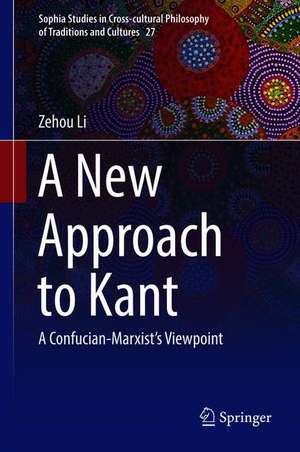A New Approach to Kant: A Confucian-Marxist’s Viewpoint: Sophia Studies in Cross-cultural Philosophy of Traditions and Cultures, cartea 27
Autor Zehou Li Traducere de Jeanne Haizhen Allen, Christopher Ahnen Limba Engleză Hardback – 8 iun 2018
| Toate formatele și edițiile | Preț | Express |
|---|---|---|
| Paperback (1) | 487.18 lei 38-44 zile | |
| Springer Nature Singapore – 10 ian 2019 | 487.18 lei 38-44 zile | |
| Hardback (1) | 736.32 lei 22-36 zile | |
| Springer Nature Singapore – 8 iun 2018 | 736.32 lei 22-36 zile |
Din seria Sophia Studies in Cross-cultural Philosophy of Traditions and Cultures
-
 Preț: 395.25 lei
Preț: 395.25 lei - 18%
 Preț: 726.69 lei
Preț: 726.69 lei - 15%
 Preț: 701.72 lei
Preț: 701.72 lei - 15%
 Preț: 651.67 lei
Preț: 651.67 lei - 18%
 Preț: 782.10 lei
Preț: 782.10 lei -
 Preț: 375.53 lei
Preț: 375.53 lei - 24%
 Preț: 1038.21 lei
Preț: 1038.21 lei -
 Preț: 375.45 lei
Preț: 375.45 lei - 20%
 Preț: 570.73 lei
Preț: 570.73 lei -
 Preț: 376.15 lei
Preț: 376.15 lei -
 Preț: 378.64 lei
Preț: 378.64 lei -
 Preț: 377.55 lei
Preț: 377.55 lei - 20%
 Preț: 559.21 lei
Preț: 559.21 lei - 20%
 Preț: 568.44 lei
Preț: 568.44 lei - 20%
 Preț: 511.16 lei
Preț: 511.16 lei - 20%
 Preț: 559.21 lei
Preț: 559.21 lei - 20%
 Preț: 567.63 lei
Preț: 567.63 lei - 24%
 Preț: 590.54 lei
Preț: 590.54 lei - 24%
 Preț: 794.98 lei
Preț: 794.98 lei - 24%
 Preț: 585.65 lei
Preț: 585.65 lei - 20%
 Preț: 521.58 lei
Preț: 521.58 lei -
 Preț: 378.64 lei
Preț: 378.64 lei -
 Preț: 479.29 lei
Preț: 479.29 lei - 20%
 Preț: 554.67 lei
Preț: 554.67 lei - 20%
 Preț: 569.86 lei
Preț: 569.86 lei - 15%
 Preț: 578.67 lei
Preț: 578.67 lei - 20%
 Preț: 556.90 lei
Preț: 556.90 lei - 18%
 Preț: 949.10 lei
Preț: 949.10 lei
Preț: 736.32 lei
Preț vechi: 897.95 lei
-18% Nou
Puncte Express: 1104
Preț estimativ în valută:
140.91€ • 146.57$ • 116.33£
140.91€ • 146.57$ • 116.33£
Carte disponibilă
Livrare economică 24 martie-07 aprilie
Preluare comenzi: 021 569.72.76
Specificații
ISBN-13: 9789811302381
ISBN-10: 9811302383
Pagini: 570
Ilustrații: XIII, 354 p.
Dimensiuni: 155 x 235 mm
Greutate: 0.69 kg
Ediția:1st ed. 2018
Editura: Springer Nature Singapore
Colecția Springer
Seria Sophia Studies in Cross-cultural Philosophy of Traditions and Cultures
Locul publicării:Singapore, Singapore
ISBN-10: 9811302383
Pagini: 570
Ilustrații: XIII, 354 p.
Dimensiuni: 155 x 235 mm
Greutate: 0.69 kg
Ediția:1st ed. 2018
Editura: Springer Nature Singapore
Colecția Springer
Seria Sophia Studies in Cross-cultural Philosophy of Traditions and Cultures
Locul publicării:Singapore, Singapore
Cuprins
The Sources and Development of Kant’s Thought.- Epistemology: Raising the Question.- Epistemology: Space and Time.- Epistemology: Categories.- Epistemology: Self-Consciousness.- Epistemology: Antinomy.- Epistemology: Things in Themselves.- Ethics: Moral Laws.- Ethics: Views on Religion, Politics, and History.- Aesthetics and Teleology: Critique of Judgment.
Notă biografică
Li Zehou is perhaps the most influential Chinese philosopher alive today, and arguably one of the most important Chinese intellectuals in the past fifty years. He became famous in the 1980s with his work on Chinese aesthetics, and is well known as a historical materialist, a Neo-Kantian, and Marxist-Confucian. Many of his works on the history of Chinese philosophy as well as his books on his own philosophical system are now being translated into English.
Jeanne Haizhen Allen received Master degree on Western Philosophy at Philosophy Department in East China Normal University, Shanghai, and currently is working on her Master thesis on Aristotle's philosophy on bodily pleasure at Classics Department in McMaster University in Canada. She has translated nine literary books from English to Chinese.
Christopher Ahn is an independent scholar and translator based in the United States.
Textul de pe ultima copertă
Originally written during the Cultural Revolution, this book introduces and interprets Kant’s critical philosophy through the lens of its author Li Zehou’s own philosophical approach: anthropological historical ontology. Li argues that the process of human development begins with and is shaped by the practical material activities associated with making and using tools in primitive societies. Over millions of years, these ever-evolving practices accumulate and become sedimented into archetypical forms that shape history, social relationships, and human psychology. Li’s views draw upon Marx’s theory of practice and, as those familiar with his work will recognize, his reinterpretation of Confucian thought with its emphasis on material life and worldly existence. Beginning with the assumption that the question at heart of Kant’s philosophy is “What is the human being?” Li offers a highly original answer by arguing that the root of Kant’s “transcendental” knowledge, universal forms, moral autonomy, and aesthetics can be found in the practical and social activities associated with tool-making. Li offers a new reading not only of Kant but of modern European philosophy, including Hegel and Marx, that forces us to rethink our understanding of the relation between individuals and communities and challenges us to ask ourselves how we can best achieve both harmony and freedom in our shared human future.
Caracteristici
The first book to discuss Kant from a Chinese perspective Is the only book of its kind in English that brings together Confucianism, Marxism, and Kantianism Offers the first English-language translation of one of Professor Li’s major philosophical works
